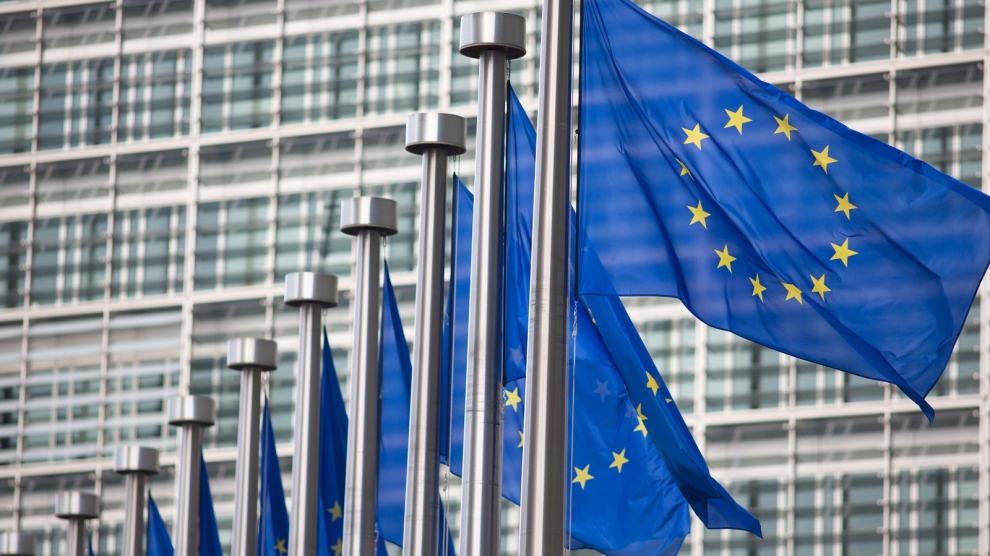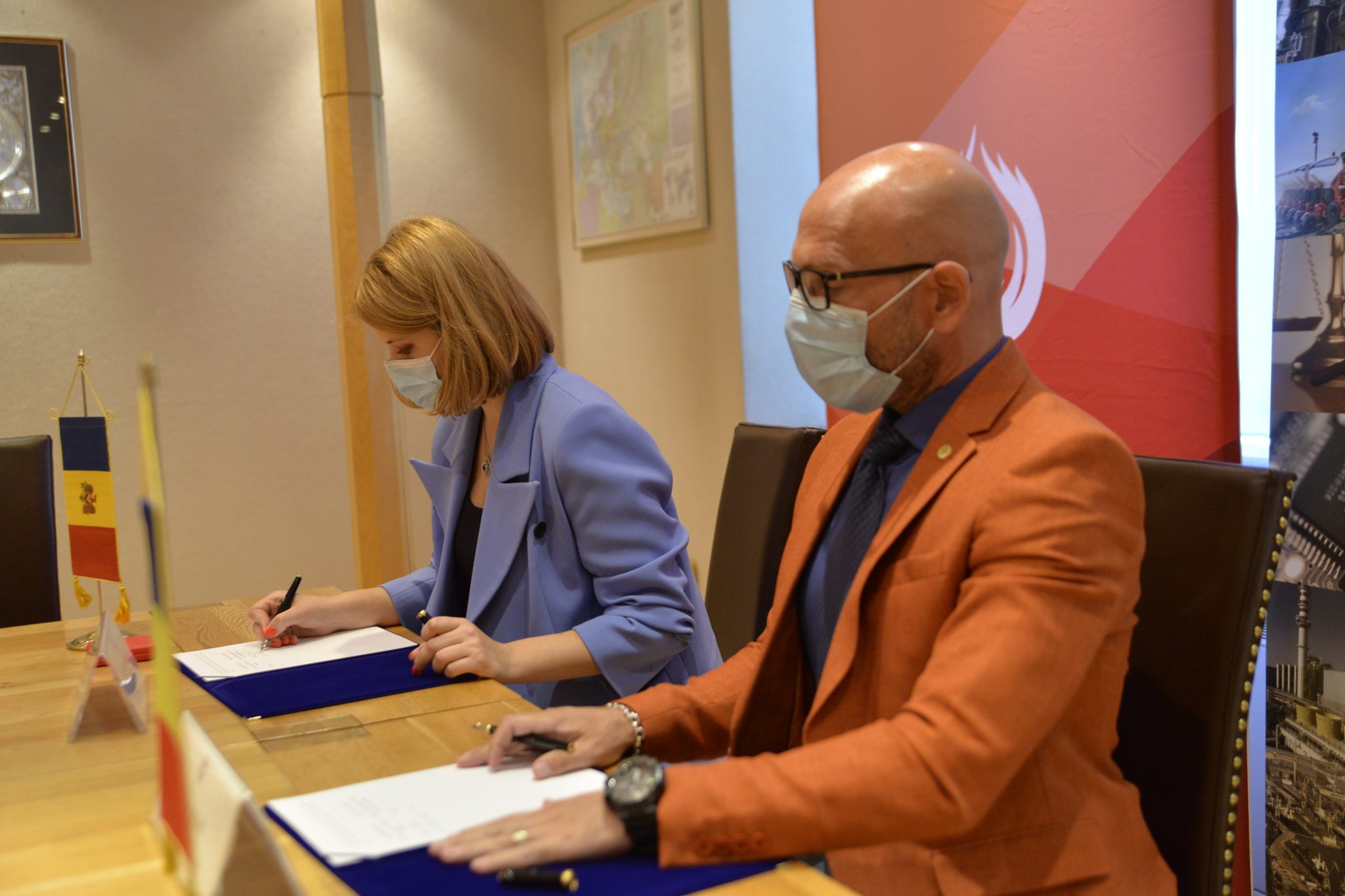Economy
Finance ministry unveils draft state budget law for 2006
The Finance Ministry has unveiled the draft state budget law for 2006. The executive will review it in late September.
According to the draft oublished on the web page of the Finance Ministry http://www.moldova.md, the incomes of the state budget in 2006 will make up 9.681,9 million lei, by 1.366,8 million lei or by 16.4 percent more than the incomes planned for 2005. Expenditure will total 9.783,1 million lei, by 2.058,9 million lei or by 26.7 percent more than in the state budget for this year.
The basic incomes of the budget will make up 8.464,6 million lei or 86.1 percent of the total sum. The own accumulations of the special funds will comprise 131.8 million lei, the special resources of the public institutions – 848.3 million lei, the foreign grants – 362.2 million lei, of which grants for budget upholding – 125.0 million lei (8 million euros) and grants for implementation of investment projects – 237.2 million lei (18.8 million dollars).
The main budget spending will be used to increase the mandatory health insurances; to supplement the transfers to the state social insurance budget; to raise the deductions to the local budgets; to increase the salaries of budgetary workers; to make capital investments; to index residents’ deposits in the Savings Bank; to pay Moldova’s dues of membership to the international organisations; tpo support the agrarian sector etc.
THE MACROECONOMIC BASIS
According to the Minister of Finance, the budgetary indicators were estimated on the basis of the forecast concerning the macroeconomic indicators updated in August, this year. Thus, the Government banks on a Gross Domestic Products of 44.2 billion lei in 2006, on the increase by 6.5 percent compared with the plans for 2005. The average rate of inflation will be of 10 percent, as against the 12-percent inflation rate expected this year. The average anual exchange rate of the national currency is estimated at 12.6 lei per 1 dollar, practically the same level envisaged for 2005.
The Ministry of Finance forecasts for next year a 13-percent rise in exports, up to 1.29 billion dollars, and a 12-percent increase in imports, up to 2.4 billion dollars. Moldova’s trade deficit by the end of the year will be of 1.1 billion dollars.
According to the official accounts, the industrial production will grow by 10 percent and will reach 24.4 billion lei in current prices, while the agricultural production will advance by only 3 percent, up to 14.5 billion lei. Investments in fixed capital in 2006 will make up about 7.3 billion lei, on the increase by 10 percent on last year in comparable prices.
AMENDMENTS TO THE FISCAL POLICY
The chief amendments to the fiscal policy will target to reduce the share of the income tax for legal entities from 18 percent in 2005 to 15 percent in 2006. It is planned to decrease the inferior and medium share of the income tax for individuals, without modifying the annual taxation scheme, from 9 percent and 14 percent established in 2005, to 8 percent and 13 percent in 2006. The maximal share of the income tax for individuals will be maintained at the level of 2005, that is of 20 percent.
The individual annual exemptions will be increased next year from 3,960 lei in 2005 to 4,500 lei in 2006. Exemptions for maintained persons will be raised from 600 lei in 2005 to 840 lei in 2006.
"Income tax collections will reduce owing to cuts in taxes, but in general the incomes will grow due to the extension of the fiscal basis and improvement of the fiscal administration," the Finance Ministry explained in a communication.
Beginning January 1, 2006, a Value Added Tax (VAT) of 20 percent will be levied on the production from phyitotechny, horticulture and animal-breeding. The tax remissions on VAT payments for the import and delivery on Moldova`s territory of medicines, pesticides and mineral fertilisers, equipment and technique will be cancelled from the same date. A reduced VAT of 8 percent will be introduced on medicines.
There will be introduced modifications concerning the adjustment of the excises on beer and tobacco products to the rate of inflation and introduction of a complex tax on cigarettes with filter; increase of the additional excise duties on the alcoholic production containing over 25 percent of alcohol, excises for cars older than three years but maximum seven years by 0.01 euros per cubic centimetre. Excises for gambling licence will be annulled next year, but the tax for licence for this sort of activity will be doubled instead.
STATE DEBT
The government-administrated state debt will grow in 2006 by 183.7 million lei or 1.4 percent, compared with the level expected at the end of this year, and will turn over 12,970.8 million lei. As much as 637.2 million lei will be used for the government-administrated state debt service (payment of interests) in 2006, or by 50.2 million lei more than in 2005.
The internal debt will account for 3,848.3 million lei next year, or by 61.2 million lei more than planned for late 2005. The growth of debt is explained through issuing of state securities, and incomes raised from their sale will go to finance the budgetary deficit. State securities worth 180 million lei will be issued in 2006.
Moldova does not plan to take loans from the National Bank of Moldova (BNM) in 2006 to finance the budgetary deficit, but it is expected to reimburse credits in the amount of 118.8 million lei contracted by government from the central bank in 2004.
"Loans from BNM (with reimbursement the same year) will be taken only to cover the temporary cash difference of the state budget, which is registered as result of a chaotic collection of budget revenues."
BNM’s loans will account for 2.092.2 million lei or 54.4 percent out of the total amount of the internal state debt, while loans in state securities will count for 1,756.1 million lei or 45.6 percent.
Also, the government-administrated external state debt is expected to amount to 729.8 million dollars in late 2006, by 9.8 million dollars or some 1.4 percent more than expected in late 2005. "The rise is explained through exceeding of loan inflows on their payment, as well as fluctuation of the exchange rate of the dollar verso other convertible currencies."
External loans in the amount of 30.5 million dollars will be reimbursed in 2006, including 28.5 million dollars for direct debt and 2.0 million dollars for guaranteed debt. Also, loans in the amount of 39.5 million dollars will be attracted next year to finance investment projects.
As much as 268.3 million lei (21.3 million dollars) will be spent next year for the government-administrated external state debt service, including 245.3 million lei (19.5 million dollars) for direct debt and 23.0 million lei (1.8 million dollars) for guaranteed debt.
Spending for external state debt service will count for 0.61 percent of the GDP, compared with 0.8 percent in 2005.
The draft budget law for 2006 was published in the Internet for public debates, according to the Finance Ministry. Earlier, Premier Vasile Tarlev had said that his cabinet is to examine the 2006 state budget by late September. // BASA-Press
Economy
Moldova will receive a disbursement of 36 million euros as part of the the Economic Recovery Plan

This week, the European Commission approved the disbursement of 36 million euros in grant money for the Republic of Moldova. The announcement was made by Deputy Director-General for Neighbourhood Policy and Enlargement Negotiations at the European Commission, Katarina Mathernova, who paid an official visit to the Republic of Moldova between September 13-15, together with Managing Director for Russia, Eastern Partnership, Central Asia, Regional cooperation and OSCE, at the European External Action Service, Michael Siebert.
The EU officials had meetings with President Maia Sandu, Minister of Foreign Affairs and European Integration, Nicu Popescu, Speaker of Parliament, Igor Grosu, Prime Minister of the country, Natalia Gavrilita, as well as key representatives of Government, international financial institutions and the civil society, according to a press release issued by the Delegation of the European Union to the Republic of Moldova.
Beside such topics as the EU-Moldova relations and prospects, the priorities of the reform agenda of the new Moldovan Government, preparations for the Eastern Partnership Summit at the end of the year and the Transnistrian conflict settlement, the officials also discussed the EU assistance in support of reforms and the Economic Recovery Plan for Moldova, which was announced in June with a total EU support of 600 million euros over the next 3 years.
“The first measures under the Economic Recovery Plan will shortly materialize, with the expected disbursement of 36 million euros in grant money under budget support programmes to support the authorities’ efforts to fight against the consequences of the pandemic. Moldova can count on EU’s assistance on its path to reforms and to recovery, bringing tangible results to citizens,” Katarina Mathernova stated.
The plan is based on assistance provided by the European Union through various bilateral and regional instruments, aiming to mobilize the funds in the form of grants, loans, guarantees and macro-financial assistance.
“The Economic Recovery Plan for the Republic of Moldova involves much more, not just this financial support provided immediately. It must help digital transformation, strengthen infrastructure, energy efficiency, education and support small and medium-sized enterprises,” the EU official also said.
As Prime Minister Natalia Gavrilita informed, “The Economic Recovery Plan and the 5 flagship initiatives for Moldova in the Eastern Partnership will directly contribute to the reform and consolidation of institutions, stimulate long-term socio-economic development, bring direct benefits to citizens, and unleash new economic opportunities through promoting the green agenda and digitization. Small and medium-sized enterprises (SMEs) have been hit hard by the crisis. Promoting and diversifying access to finance and reducing collateral requirements will be essential in supporting economic operators. We are grateful to the EU partners who will launch two programs to support 50 000 independent Moldovan SMEs to adapt to the new conditions.”
President of the Republic of Moldova, Maia Sandu, welcomed the decision of the European Union to disburse about 745 million lei in grant money, as the official page of the President’s Office announced. “EU support comes after a long period of freezing of European assistance, caused by former governments. We managed to relaunch the political dialogue with the European Union and resume financial assistance. The Republic of Moldova is gradually regaining the trust of its strategic partners. This European support is also a signal of encouragement for the new Government team in its commitment to clean up the institutions, fight corruption and launch development programs in the country,” said Maia Sandu.
Photo: unknown
Economy
Romania and Moldova signed a partnership memorandum pledging to cooperate in promoting their wines

The Chamber of Commerce and Industry of Romania (CCIR) and the National Office for Vine and Wine (NOVW) of the Republic of Moldova signed, last week, a memorandum of cooperation on organizing joint promotional activities in the markets of common interest, as the CCIR announced.
China, Japan or the USA are just some of the markets targeted by the Romanian and Moldovan institutions. The memorandum also involves advertising activities for wines from common indigenous varieties, promoting the oeno-tourist region, developing a tourist route in the two states, exchange of experience, study visits, and mutual support in identifying new export opportunities. “We are very confident that this collaboration between our organizations will lead to sustainable economic growth and a higher degree of well-being among Moldovans and Romanians,” claimed Deputy Secretary-General of CCIR, Bogdan Visan.
On the other hand, Director of the NOVW, Cristina Frolov, declared that no open competition with Romania is aimed at the governmental level of the Republic of Moldova. “This request for collaboration is a consequence of the partnership principle. Romania imports 10-12% of the wine it consumes, and we want to take more from this import quota. Every year, the Romanian market grows by approximately 2.8%, as it happened in 2020, and we are interested in taking a maximum share of this percentage of imported wines without entering into direct competition with the Romanian producer,” the Moldovan official said. She also mentioned that Moldova aims at increasing the market share of wine production by at least 50% compared to 2020, and the number of producers present on the Romanian market – by at least 40%.

Source: ccir.ro
**
According to the data of the Romanian National Trade Register Office, the total value of Romania-Moldova trade was 1.7 billion euros at the end of last year and over 805 million euros at the end of May 2021. In July 2021, there were 6 522 companies from the Republic of Moldova in Romania, with a total capital value of 45.9 million euros.
The data of Moldova’s National Office of Vine and Wine showed that, in the first 7 months of 2021, the total quantity of bottled wine was about 27 million litres (registering an increase of 10% as compared to the same period last year), with a value of more than one billion lei, which is 32% more than the same period last year. Moldovan wines were awarded 956 medals at 32 international competitions in 2020.
Photo: ccir.ro
Economy
Moldova’s hope to be a top walnut exporter and its main difficulties

The Republic of Moldova has perfect weather conditions for growing walnut trees, that creating a great potential of walnut production and trade, especially on international markets, where the demand is way higher than the product’s supply. National and international experts believe that the country’s walnut production industry is on the verge of important transformations, which could lead to increased yields, quality and competitiveness worldwide.
According to authorities, Moldova exports 34-35 thousand tons of walnuts in shell, which is about 7% of the total export of fruit and 5% of the total export of horticultural products. The export value is assessed as being $120 million, that being 57-60% of the total fruit export value and about 50% of horticultural export value. Most of walnut crops are exported to the EU countries, such as France, Germany, the Netherlands, Romania and Austria. The country’s exports were among the world’s top 10 when it comes to the highest dollar value of the product during 2020.
Viorel Gherciu, Minister of Agriculture and Food Industry, pointed out that the production in the domestic walnut industry has increased by 55% in the last five years, which ranks Moldova among the main producers in the world.
“The biggest opportunity for this industry is that we are in the geographical proximity of the largest walnut import area in the world, which is the European Union, with almost 40% of total imports in the world. We are on the EU border, with privileged relations, with an Association Agreement. We already enjoy a good relationship in working with European importers, they trust our processors. A very close collaboration has been created and this is, in fact, the guarantee for those who invest in the area,” claimed the president of the Walnut Producers Association, Oleg Tirsina.
The data provided by the National Bureau of Statistics show that there are 34.7 thousand hectares of walnut plantations in the country. 20.90 hectares are represented by orchards. 75% of planted orchards are formed of old varieties trees. 30-35% of the exported production comes from orchards, the rest comes from individual farmers and plantations along the roads. This means that the quality of walnut production is not at its maximum potential. Developing commercial plantations through orchards modernization and extension of walnut varieties would provide double yield and better quality, experts say.
Governmental support in the form of subsidizing solutions, foreign investments and credit options are indispensable for the industry development. One of the financing options is the credit line of the European Investment Bank Project. Since 2016, 15 producers and processors of nuts, almonds and hazelnuts have benefited from these loans with the total amount of investments worth 8.7 million euros. A further extension of the project would provide another 60 million euros for the modernization of the horticultural sector in general and for harvesting organic walnuts in particular.
Photo: heymoldova.com





















